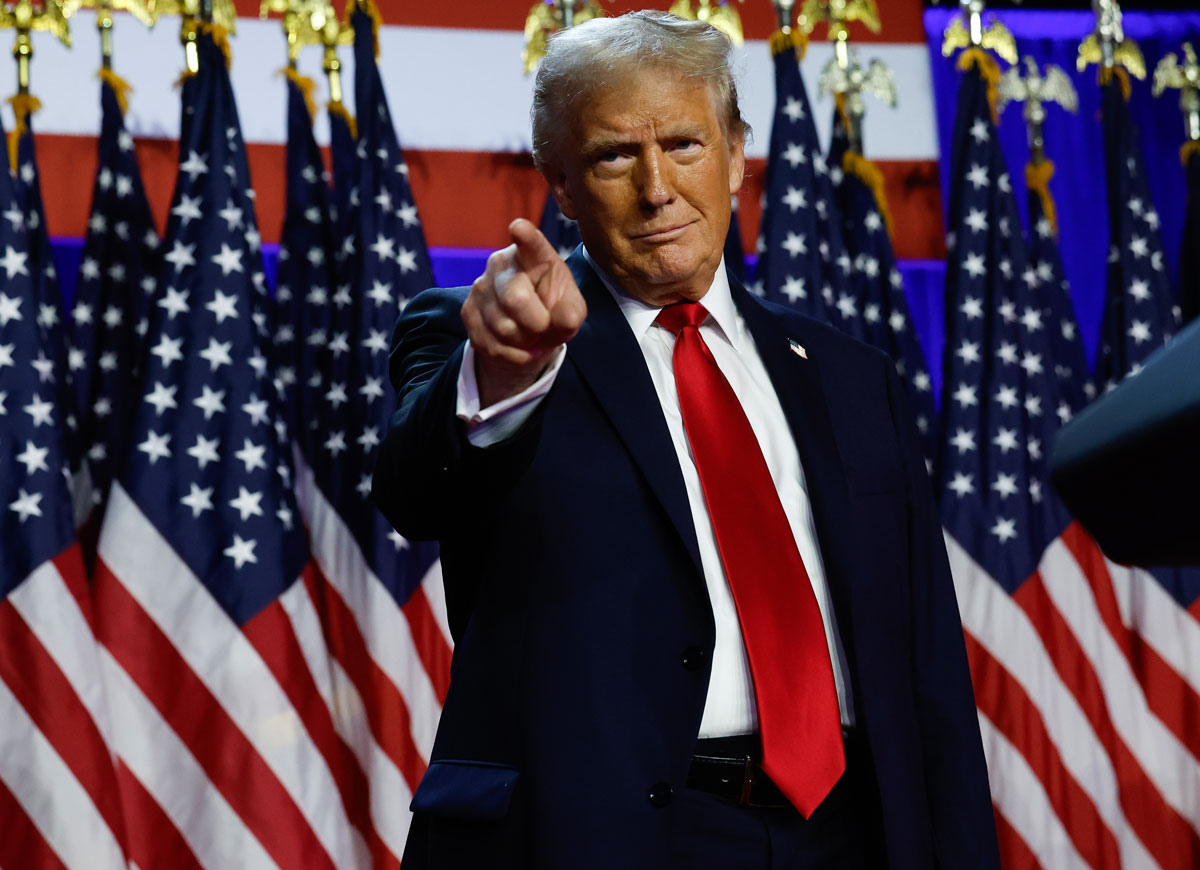

WEST PALM BEACH, FLORIDA - NOVEMBER 06: Republican presidential nominee, former U.S. President Donald Trump arrives to speak during an election night event at the Palm Beach Convention Center on November 06, 2024 in West Palm Beach, Florida. Americans cast their ballots today in the presidential race between Republican nominee former President Donald Trump and Vice President Kamala Harris, as well as multiple state elections that will determine the balance of power in Congress. (Photo by Chip Somodevilla/Getty Images)
For the first time, President Donald Trump suggested that his aggressive tariffs on key trade partners could lead to a recession.
In an interview aired Sunday, Trump told Fox News host Maria Bartiromo that while the economy was in a “transition period,” he believed his policies would ultimately benefit the country. Bartiromo asked Trump for clarity regarding reciprocal tariffs, to which he responded, “We may go up with some tariffs. It depends. We may go up. I don’t think we’ll go down, or we may go up.”
>READ MORE: TRUMP ADMITS TARIFFS MAY WORSEN INFLATION
His recent tariffs on Canada, Mexico and China have sparked a backlash from various industries, with automakers warning of severe economic consequences. In response, Canada imposed retaliatory tariffs on $20.5 billion worth of U.S. exports, while China has introduced its own countermeasures and plans further action.
Subscribe to our free weekly newsletter!
A week of political news in your in-box.
We find the news you need to know, so you don't have to.
Trump’s administration is set to introduce a 25% tariff on foreign steel and aluminum this week, with additional tariffs expected on April 2 as part of his “reciprocal tariffs” plan. Trump defended these measures, arguing that the U.S. has been “ripped off for decades” and that his policies are necessary to restore economic fairness.
Economists, however, have expressed growing alarm over the uncertainty created by Trump’s tariff strategy. Some fear the resulting instability will discourage business investments and hiring, potentially worsening an economic slowdown.
Commerce Secretary Howard Lutnick dismissed recession concerns, claiming that tariffs would fuel economic growth. He claimed that while foreign goods may become more expensive, domestic products would see lower prices, benefiting American consumers. However, many economists argue that tariffs often allow U.S. businesses to raise prices without competition, potentially burdening consumers instead.
Financial institutions like JP Morgan and Goldman Sachs have raised the probability of a recession in the next 12 months, but Lutnick remained confident. “I would never bet on a recession. No chance,” he said. “Foreign goods may get a little more expensive. But American goods are going to get cheaper, and you’re going to be helping Americans by buying American.”
Tesla CEO Elon Musk has apologized for his public falling out with President Donald Trump.…
Sen. Chris Murphy (D-Connecticut) has launched a new political action committee (PAC), the American Mobilization…
Brit Hume, the Fox News chief political analyst, contradicted President Donald Trump's statement to the…
FBI Director Kash Patel has revealed that his home was "swatted" last week. "As Director…
Commerce Secretary Howard Lutnick announced the launch of the $5 million "gold card" U.S. residency…
In a new study, nearly 50% of Tesla owners report their vehicles have been vandalized,…